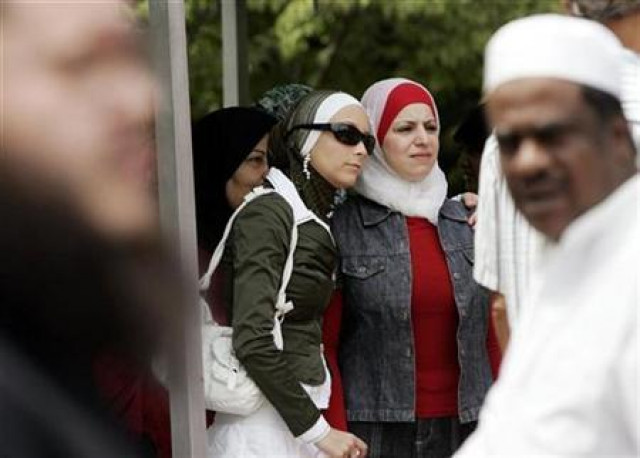Feeling intimidated, Jews and Muslims band together in Trump's America
'You have to have a plan'

Muslim women stand outside the Islamic Center of Passaic County after Friday prayers in Paterson, New Jersey, July 13, 2007. PHOTO: REUTERS
Putting aside their differences, they are forming groups and joining existing interfaith coalitions. Vaseem Firdaus, a Muslim who has been living in the United States for over 40 years, spent Friday night at a Shabbat dinner with members of a women’s group called the Sisterhood of Salaam Shalom.
Up until Mr Trump was elected president, Firdaus felt secure living as a Muslim in America. Now Trump's surprising election victory has shaken her sense of comfort and security.
Here's what the Kaaba looks like from inside
She spoke with four other Jewish women who told her that Trump’s claims to bar Muslims from entering the country once he was elected along with registering those already living here reminded them of the years leading up to the Holocaust.
“When did you know it was time to leave?” Firdaus asked a woman who just narrated the reasons behind her relatives fleeing the Nazis. “The ones that didn’t leave are the ones who went to Auschwitz.”
The Jewish women tried to convince Firdaus she wouldn’t be alone if it came to registering Muslims. “If Muslims have to register, we’re all going to register,” said Mahela Morrow-Jones.
She's not the only Jew to hit out against Trump’s plans to register Muslims.
Jonathan Greenblatt, the chief executive of the Anti-Defamation League, said in a recent interview: “Jews know what it means to be identified and tagged, to be registered and pulled aside. It evokes very deep emotions in the Jewish community.”
Greenblatt received a standing ovation when he declared that if Muslims were ever forced to register, “that is the day that this proud Jew will register as a Muslim.”
“All of us have heard the story of the Danish king who said if his country’s Jews had to wear a gold star,” he said, “all of Denmark would, too.”
Nearly 500 Muslim and Jewish women, attended the third annual conference of the Sisterhood of Salaam Shalom on Sunday at Drew University in New Jersey, with many wearing headscarves and skullcaps.
They traded stories about the surge of hate crime in their respective areas.
“Ignorance is one of the key triggers of hate,” said Sheryl Olitzky, the group’s executive director, in her opening remarks. “We need to show the world that we are Americans. We are here because we love each other and we’re overcoming hate.”
The Sisterhood is among several groups expanding their work to improve Muslim-Jewish relations. The Anti-Defamation League has also been working against anti-Muslim bigotry.
“It’s the Trump effect,” said Imam Abdullah Antepli, the chief representative on Muslim affairs at Duke University, who attended the women’s conference with his wife. “I see the Muslim community even more eager to reach out and to put aside the grievances of the past.”
Despite this unity, tensions over Israel continue to exist. The Anti-Defamation League along with several other Jewish groups, recently declared their opposition to a bid by Representative Keith Ellison to become chairman of the Democratic National Committee, owing to his critical statements against Israel.
US Muslims eye future under Trump with apprehension
A few Jewish groups have gone to the extent of applauding Trump’s choice for national security adviser Lt Gen Michael T Flynn. He has branded Islam “a cancer” and a “political ideology” masquerading as a faith causing Firdaus and others to seriously reconsider their future in the US.
For now, though, attending the Sisterhood conference made Firdaus feel a little bit more optimistic.
“Sitting here makes you feel it’s really not so hopeless. This is food for the soul,” Firdaus said. “But there were 60 million people who voted for Trump. I’m not ready to leave, but you have to have a plan.”
This article originally appeared in The New York Times.



















COMMENTS
Comments are moderated and generally will be posted if they are on-topic and not abusive.
For more information, please see our Comments FAQ